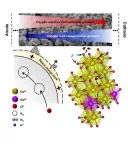(Press-News.org) BOSTON – (March 11, 2024) Mass General Brigham is establishing the Implantable Brain-Computer Interface Collaborative Community (iBCI-CC). This is the first Collaborative Community in the clinical neurosciences that has participation from the U.S. Food and Drug Administration (FDA).
BCIs are devices that interface with the nervous system and use software to interpret neural activity. Commonly, they are designed for improved access to communication or other technologies for people with physical disability. Implantable BCIs are investigational devices that hold the promise of unlocking new frontiers in restorative neurotechnology, offering potential breakthroughs in neurorehabilitation and in restoring function for people living with neurologic disease or injury.
The iBCI-CC (https://www.ibci-cc.org/) is a groundbreaking initiative aimed at fostering collaboration among diverse stakeholders to accelerate the development, safety and accessibility of iBCI technologies. The iBCI-CC brings together researchers, clinicians, medical device manufacturers, patient advocacy groups and individuals with lived experience of neurological conditions. This collaborative effort aims to propel the field of iBCIs forward by employing harmonized approaches that drive continuous innovation and ensure equitable access to these transformative technologies.
One of the first milestones for the iBCI-CC was to engage the participation of the FDA. “Brain-computer interfaces have the potential to restore lost function for patients suffering from a variety of neurological conditions. However, there are clinical, regulatory, coverage and payment questions that remain, which may impede patient access to this novel technology,” said David McMullen, M.D., Director of the Office of Neurological and Physical Medicine Devices in the FDA’s Center for Devices and Radiological Health (CDRH), and FDA member of the iBCI-CC. “The IBCI-CC will serve as an open venue to identify, discuss and develop approaches for overcoming these hurdles.”
The iBCI-CC will hold regular meetings open both to its members and the public to ensure inclusivity and transparency. Mass General Brigham will serve as the convener of the iBCI-CC, providing administrative support and ensuring alignment with the community’s objectives.
Over the past year, the iBCI-CC was organized by the interdisciplinary collaboration of leaders including Leigh Hochberg, MD, PhD, an internationally respected leader in BCI development and clinical testing and director of the Center for Neurotechnology and Neurorecovery at Massachusetts General Hospital; Jennifer French, MBA, executive director of the Neurotech Network and a Paralympic silver medalist; and Joe Lennerz, MD, PhD, a regulatory science expert and director of the Pathology Innovation Collaborative Community. These three organizers lead a distinguished group of Charter Signatories representing a diverse range of expertise and organizations.
“As a neurointensive care physician, I know how many patients with neurologic disorders could benefit from these devices,” said Dr. Hochberg. “Increasing discoveries in academia and the launch of multiple iBCI and related neurotech companies means that the time is right to identify common goals and metrics so that iBCIs are not only safe and effective, but also have thoroughly considered the design and function preferences of the people who hope to use them”.
Jennifer French, said, “Bringing diverse perspectives together, including those with lived experience, is a critical component to help address complex issues facing this field.” French has decades of experience working in the neurotech and patient advocacy fields. Living with a spinal cord injury, she also uses an implanted neurotech device for daily functions. “This ecosystem of neuroscience is on the cusp to collectively move the field forward by addressing access to the latest groundbreaking technology, in an equitable and ethical way. We can’t wait to engage and recruit the broader BCI community.”
Joe Lennerz, MD, PhD, emphasized, "Engaging in pre-competitive initiatives offers an often-overlooked avenue to drive meaningful progress. The collaboration of numerous thought leaders plays a pivotal role, with a crucial emphasis on regulatory engagement to unlock benefits for patients."
The iBCI-CC is supported by key stakeholders within the Mass General Brigham system. Merit Cudkowicz, MD, MSc, chair of the Neurology Department, director of the Sean M. Healey and AMG Center for ALS at Massachusetts General Hospital, and Julianne Dorn Professor of Neurology at Harvard Medical School, said, “There is tremendous excitement in the ALS [amyotrophic lateral sclerosis, or Lou Gehrig’s disease] community for new devices that could ease and improve the ability of people with advanced ALS to communicate with their family, friends, and care partners. This important collaborative community will help to speed the development of a new class of neurologic devices to help our patients.”
Bailey McGuire, program manager of strategy and operations at Mass General Brigham’s Data Science Office, said, “We are thrilled to convene the iBCI-CC at Mass General Brigham’s DSO. By providing an administrative infrastructure, we want to help the iBCI-CC advance regulatory science and accelerate the availability of iBCI solutions that incorporate novel hardware and software that can benefit individuals with neurological conditions. We’re excited to help in this incredible space.”
For more information about the iBCI-CC, please visit https://www.ibci-cc.org/.
About Mass General Brigham
Mass General Brigham is an integrated academic health care system, uniting great minds to solve the hardest problems in medicine for our communities and the world. Mass General Brigham connects a full continuum of care across a system of academic medical centers, community and specialty hospitals, a health insurance plan, physician networks, community health centers, home care, and long-term care services. Mass General Brigham is a nonprofit organization committed to patient care, research, teaching, and service to the community. In addition, Mass General Brigham is one of the nation’s leading biomedical research organizations with several Harvard Medical School teaching hospitals. For more information, please visit massgeneralbrigham.org.
About the iBCI-CC Organizers:
Leigh Hochberg, MD, PhD is a neurointensivist at Massachusetts General Hospital’s Department of Neurology, where he directs the MGH Center for Neurotechnology and Neurorecovery. He is also the IDE Sponsor-Investigator and Director of the BrainGate clinical trials, conducted by a consortium of scientists and clinicians at Brown, Emory, MGH, VA Providence, Stanford, and UC-Davis; the L. Herbert Ballou University Professor of Engineering and Professor of Brain Science at Brown University; Senior Lecturer on Neurology at Harvard Medical School; and Associate Director, VA RR&D Center for Neurorestoration and Neurotechnology in Providence.
Jennifer French, MBA, is the Executive Director of Neurotech Network, a nonprofit organization that focuses on education and advocacy of neurotechnologies. She serves on several Boards including the IEEE Neuroethics Initiative, Institute of Neuroethics, OpenMind platform, BRAIN Initiative Multi-Council and Neuroethics Working Groups, and the American Brain Coalition. She is the author of On My Feet Again (Neurotech Press, 2013) and is co-author of Bionic Pioneers (Neurotech Press, 2014). French lives with tetraplegia due to a spinal cord injury. She is an early user of an experimental implanted neural prosthesis for paralysis and is the Past-President and Founding member of the North American SCI Consortium.
Joe Lennerz, MD PhD, serves as the Chief Scientific Officer at BostonGene, an AI analytics and genomics startup based in Boston. Dr. Lennerz obtained a PhD in neurosciences, specializing in electrophysiology. He works on biomarker development and migraine research. Additionally, he is the co-founder and leader of the Pathology Innovation Collaborative Community, a regulatory science initiative focusing on diagnostics and software as a medical device (SaMD), convened by the Medical Device Innovation Consortium. He also serves as the co-chair of the federal Clinical Laboratory Fee Schedule (CLFS) advisory panel to the Centers for Medicare & Medicaid Services (CMS).
END
Implantable brain-computer interface collaborative community (iBCI-CC) to drive innovation in neurotechnology
2024-03-11
ELSE PRESS RELEASES FROM THIS DATE:
Political rage on social media is making us cynical
2024-03-11
Political anger and cynicism are rising in the United States and in many democracies worldwide, and both are associated with exposure to political attacks on social media, a new University of Michigan study shows.
Americans use social media to find information and news about politics, but much of the content they see in their feeds is hostile, uncivil and attacking, said lead author Ariel Hasell, assistant professor of communication and media and an affiliate of the Center for Political Studies at the U-M Institute for Social Research.
Hasell ...
Emergency room culture may deter medical students from selecting specialty
2024-03-11
FINDINGS
In a new UCLA Health study, 25 medical students pursuing emergency medicine were interviewed about their experiences working in an emergency room during clinical rotations. Four themes were identified in their answers: watching difficult interactions between patient and care team and among the care team was distressing; women participants found that culture to be exclusionary; traits – like assertiveness and self-advocacy – were favored; and access to mentors, representation, and exposure to environment influenced interest towards the specialty. Most of the medical students interviewed -- 21 ...
CPRIT grant supports UH College of Pharmacy fight against rare genetic disorder
2024-03-11
The University of Houston College of Pharmacy is included in a $68.5 million funding package from the Cancer Prevention and Research Institute of Texas (CPRIT).
Ming Hu, Diana S-L. Chow Endowed Professor of Drug Discovery and Development, and Gregory Cuny, Joseph P. & Shirley Shipman Buckley Endowed Professor of Drug Discovery, received $1.4 million to fight familial adenomatous polyposis (FAP), a devastating and rare genetic disorder of the gastrointestinal tract that can cause hundreds or thousands of polyps inside the colon ...
Trauma screening may improve mental health service recommendations for children
2024-03-11
UNIVERSITY PARK, Pa. — Each year between 200,000 and 270,000 children and youth enter foster care placements with child welfare services, and many more children receive child welfare services while remaining in their parent's care, according to the U.S. Department of Health and Human Services. Although many of these children have a documented history of abuse or neglect, children may respond differently to incidents of maltreatment or other potentially traumatic events. Incorporating a trauma screening — which assesses how trauma and maltreatment affected each child — into the child welfare evaluation process provides information that could be used to ...
Wrist device that monitors activity could help provide early warning of Alzheimer’s
2024-03-11
Monitoring daily activity patterns using a wrist-worn device may detect early warning signs of Alzheimer’s disease, according to a new study led by researchers at the Johns Hopkins Bloomberg School of Public Health.
The researchers analyzed movement data from wristwatch-like devices called actigraphs worn by 82 cognitively healthy older adults who were participants in a long-running study of aging. Some of the participants had detectable brain amyloid buildup as measured by PET scan. Buildup of the protein amyloid beta in the brain is a key feature of Alzheimer’s disease.
Using a sensitive statistical technique, the ...
Synergistic proton and oxygen-ion transport in fluorite oxide-ion conductor
2024-03-11
They published their work on new superionic mechanism in fluorite oxide electrolyte for low temperature protonic ceramic fuel cells in Energy Material Advances.
"The development of low-temperature and high-performance solid oxide fuel cells is imperative." said corresponding author Dr. Jianbing Huang, Associate Professor of the State Key Laboratory of Multiphase Flow in Power Engineering, Xi'an Jiaotong University.
Dr. Huang explained that protonic ceramic fuel cell has several significant advantages as an alternative solid oxide fuel cell ...
Complex chemistry in the cold depths of space (video)
2024-03-11
WASHINGTON, March 11, 2024 — For years, scientists thought some complex molecules could only be formed on Earth. But what if we found these kinds of molecules out in space after all? In this episode of Reactions, we explore new findings that show complex carbon ring structures can be formed in space, and what that might mean for biology, chemistry and our own chemical history! https://youtu.be/Jh_O5JP10aQ?si=HFvdSchFY95y4idV
Reactions is a video series produced by the American Chemical Society and PBS Digital Studios. Subscribe to Reactions at http://bit.ly/ACSReactions and follow us on Twitter @ACSReactions.
The ...
TaskMatrix.AI: Making big models do small jobs with APIs
2024-03-11
A research team at Microsoft has designed an efficiency tool called TaskMatrix.AI that can be used to accomplish a wide variety of specific AI tasks. TaskMatrix.AI connects general-purpose foundation models like GPT-4, the model behind ChatGPT, with specialized models suitable for certain tasks — much like a human project manager. This research was published Feb. 16 in Intelligent Computing, a Science Partner Journal.
Foundation models and specialized models usually have different mechanisms thus are not easily compatible. Rather than modifying and integrating existing models, TaskMatrix.AI bridges the gaps between them through application ...
Turns out—male roundworms are picky when choosing a mate, new research finds
2024-03-11
A piece of rotting fruit is likely covered in hundreds if not thousands of microscopic roundworms, including C. elegans—a popular experimental model system for studying neurogenetics. With a lifespan of only a few weeks, C. elegans must reproduce quickly and often. The species is made up of hermaphrodites and males. The hermaphrodites have female bodies, can self-fertilize, and can mate with males. Recent research from of the Portman Lab at the Del Monte Institute for Neuroscience at the University of Rochester, found the males do not mate indiscriminately—they are selective about things like age, mating history, and nutrition.
“We ...
Anemonefish are better taxonomists than humans
2024-03-11
Anemonefish form mutualistic relationships with the sea anemones they live in and these associations are not random: some species such as the yellow-tail anemonefish (Amphiprion clarkii) are generalists and can live in almost any sea anemone, others like the tomato clownfish (Amphiprion frenatus) are specialists, living in only one sea anemone species, the bubble-tip sea anemone (Entacmaea quadricolor). Reasons for these preferences are unclear because we know very little about the genetic diversity of giant sea anemones.
Researchers at the Marine Eco-Evo-Devo Unit and Marine Genomics Unit at the Okinawa Institute of Science ...





